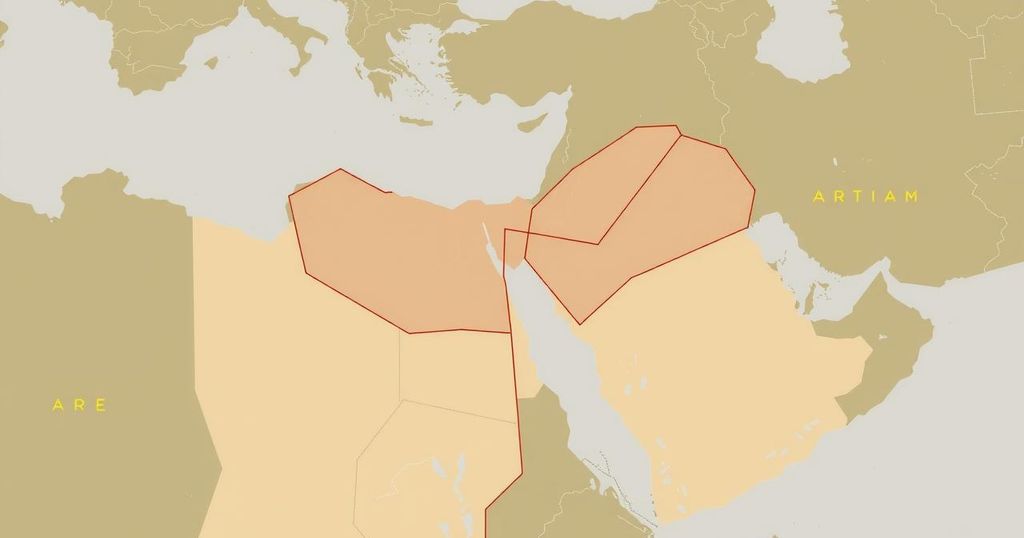Voluntary Land Swaps: A Potential Strategy for Middle East Stability
The article discusses the possibility of voluntary land swaps in the Middle East as a strategy for achieving stability, particularly focusing on Jordan’s need to reconfigure its borders in response to rising regional threats. It highlights the historical context, current security dilemmas, and the potential benefits of such swaps for both Jordan and Israel. The importance of leadership and private negotiations in realizing these ideas is underscored as crucial for achieving a safer future.
In the tumultuous landscape of the Middle East, the idea of voluntary land swaps has resurfaced as a possible pathway toward stability. Current borders, often drawn with little regard for the complexities of the region, may benefit from a reevaluation. The end of the 1920-2024 Syrian arrangement, coupled with the leadership of U.S. President Donald Trump and the rising threats from neighboring territories, presents a ripe opportunity for a mutually advantageous border reshuffle.
Jordan, an essential U.S. ally, finds itself in a precarious position due to its historically indefensible borders. The kingdom’s genesis can be traced back to the French dismantling of the Arab Kingdom of Syria, resulting in the British allocation of land to the Hashemites. Throughout the 20th century, Jordan faced threats primarily from Israel, notably in the 1948 and 1967 wars. Today, however, the tables have turned; Israel is now a strategic ally while the threats loom from the east and north, primarily in the form of Iran and rising extremist factions.
The current security climate is alarming for Jordan, particularly following the collapse of the Assad regime, which has left a power vacuum in southern Syria. The swift advances of various forces and the resurgence of Turkey on the regional stage are particularly worrisome. Enemies like ISIS, al-Qaeda, and Hezbollah now pose direct threats to Jordan. This significant shift in the regional security dynamic points to the necessity of realigning Jordan’s territorial claims for more effective defense.
The notion of a land swap could enable Jordan to strengthen its defenses by acquiring southern Syrian territory in exchange for the less strategically valuable western edge of its kingdom. This repositioning could restore Jordan’s economic stature and reestablish its role as a leader in regional affairs, possibly even offering autonomy for the Druze people in southern Syria. This reconfiguration could echo Jordan’s historical roots and enhance its position in a time of insecurity.
Israel’s own security concerns cannot be ignored; the events of October 7 and the changes in Syria underline the inadequacy of the current borders for national defense. The geopolitical landscape stresses that the Jordan River does little to guard against well-armed aggressors. A military intrusion from that direction could lead to rapid advances towards major Israeli cities without any buffer, increasing the urgency for Israel to consider moving defense lines.
One potential solution could involve the Israeli military presence in southern Syria to bolster Jordan’s defense while enabling Jordanian forces to secure western borders. This arrangement appears to be strategically beneficial, potentially enhancing the deterrence against attacks on both nations. This renewed approach could stimulate economic growth across Jordan, transforming the Syrian desert and creating shared prospects for prosperity.
Additionally, this swap could potentially support stability as Syria attempts to consolidate its own power while simultaneously easing tension in the region, especially with regard to Europe’s security interests. No population transfers would complicate this swapping of territory; instead, current residents would remain in place while benefiting from the new geopolitical realities.
Although this initiative is distinct from the Palestinian issue, it could alleviate some opposition to Palestinian statehood by establishing a buffer zone for Israel along the river, potentially easing security concerns surrounding the West Bank. However, complications remain as ongoing geopolitical ideologies threaten stability in wider contexts, including in the U.S.
It is important to note that such discussions about land swaps require secret negotiations among influential leaders who can facilitate real change. Presently, strong leadership exists in figures like President Trump, whose recent Middle East outreach demonstrates a unique potential to reshape existing conflicts into mutually beneficial arrangements. By fostering dialogue in private settings, there is a real opportunity to not only address current threats but also to adopt innovative frameworks for lasting peace in the region.
In final thoughts, the idea of voluntary land swaps in the Middle East may seem bold, yet it offers a pragmatic approach to the entwined issues of security, stability, and territorial integrity. Engaging in thoughtful negotiations could usher in a new era where all parties significantly benefit.
In conclusion, the proposition of voluntary land swaps in the Middle East encourages a rethinking of borders to enhance stability and security for Jordan and Israel. With rising threats and changing dynamics, such a swap could lead to significant economic advantages for Jordan, fortify defenses against potential aggressors, and promote regional cooperation. Ultimately, effective leadership and dedicated negotiations are essential to moving these ideas forward.
Original Source: www.jpost.com




Post Comment